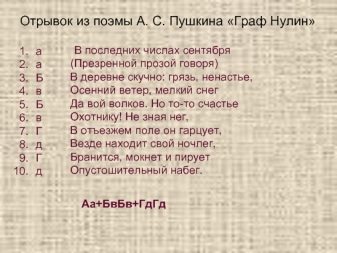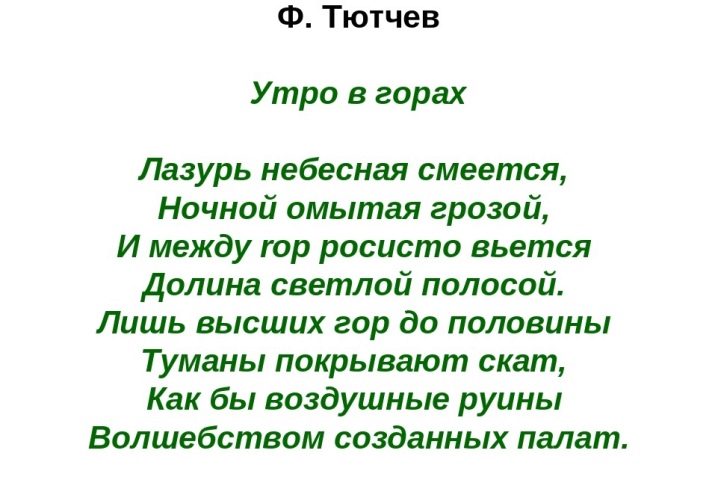Poems for the development of memory

Every person at some point has to turn to poetry. But not everyone is able to perceive poems and keep them in their head.
Peculiarities
Poems are easier to remember than prose, because they have their own rhythmic pattern, rhyme and emotional background. Memorizing poetic lines by heart is recommended for the development of memory. During this process, neurons are additionally supplied with blood. This helps to reduce the risk of blood clots, improve the quality of the vascular walls, and enhance the signal transmission between neurons. In the brain structures, new connections are formed between cells, stimulating cognitive processes and other personality abilities.
Rhythm, melody, imagery, emotional content of poetic works allow the brain to quickly engage in the memorization process and fix the lines in the memory that are connected in a natural way. In this case, the formation of the following qualities occurs:
- development and enrichment of speech;
- replenishment of vocabulary;
- expansion of erudition;
- improved diction;
- stimulation of oratorical skills.

Memorizing even a few lines of poetry has a positive effect on the biochemical processes of the structures of the brain. Memorizing verses is necessary for training memory in children and adults. The individual characteristics of the perception of each person should be taken into account. An individual with a motor memory is wonderful at memorizing poetry if it is accompanied by gestures and pantomime. A well-developed visual memory involves memorizing poetic material from a printed publication.People who perceive information well by ear are recommended to memorize the text at the time of the sound of the audio recording, while it is advisable to pronounce it aloud.
To improve the fixation of verses in memory, the methods of mnemonics are used, which activate figurative thinking. The main mistake when memorizing a poetic work is focusing on words, trying to keep them in your memory.
In fact, you need to see vivid images and vivid plots in a simple rhymed set of words. This technique is effective.

What verses are suitable?
In childhood, understandable rhymed phrases are easy to remember. Developmental quatrains should not consist of difficult and incomprehensible words. For the smallest, for quick memorization, short rhymes with fascinating content are recommended. The poems of Agnia Barto, Samuil Marshak, Elena Blaginina, Korney Chukovsky, Sergei Mikhalkov are suitable for kids. Older children are encouraged to learn nature poems. They are asked to play tongue twisters in a certain rhythm so that they resemble rhymes.
Let's give examples of such tongue twisters.
- Vika chews blackberries, magpies bite strawberries.
- Kostya mows hay in Senya, and Senya carries hay in the canopy. Senya is carrying hay in the canopy, Senya will sleep in the hay.
In the future, children get acquainted with more voluminous poems. They are advised to take the works of A.S. Pushkin, M. Yu. Lermontov, A.T. Tvardovsky. For senior pupils a list of poetic works by A.S. Pushkin should be expanded.
Experts recommend memorizing large fragments from the poem "Count Nulin" and the novel in verse "Eugene Onegin".


For adults, favorite verses of famous poets are best suited for memorization. They are usually clear to the reader. The clear rhythm of the poem gives the process of fixation in memory lightness and joy. Complex pieces train the brain well.
Poetry collections are published in sufficient numbers. If necessary, any poetry can be found on the Internet. To study for every day they offer to choose the works of Fyodor Tyutchev, Afanasy Fet, Vladimir Mayakovsky.
Memorizing poetry every day for 15 minutes is the prevention of memory problems. The ability to keep the necessary information in the head is developed. Elderly people manage to maintain clarity of mind and a solid memory.
What is the best way to teach?
For effective memorization of poems, eido technology is used. It is based on figurative representations without the inclusion of logical thinking. The poem is recommended to be memorized line by line. It is necessary to visually transform each line into a bright picture. The created images must obey a certain rhythm.
For example, let's try to "revive" the poem F. Tyutchev "Morning in the mountains". First, you need to mentally combine the first 2 lines and create colorful images. The word "azure" is associated with the name Lazarus, so you can imagine a biblical character laughing loudly in the blue skies. At this moment, part of the sky darkens. In the black sky, dotted with bright stars, there is a discharge of lightning, from which a stream of water washes Lazarus.
The imaginary picture is associated with the first lines of the work, reciting them rhythmically out loud.

Then you have to imagine the mountains. An unusual adverb formed from the word "dew" is replaced by the word "racists" for better memorization in the imagination. Maybe someone will imagine people with different skin colors on the zigzag light strip of the valley located between the mountains. And again the lines are spoken in rhythm with a mental representation of the newly created bright picture.
The next quatrain can be visualized as follows. They imagine mountains in lush dresses, as if they are in high society, at an old ball. The ball gown is only half visible. Further, a huge blanket, woven of fog, is spread.A veil of mist hung over a flat-bodied cartilaginous fish whose name coincides with the word for gentle descent. In your imagination, you can combine these two concepts and imagine a stingray on an inclined surface covered with a foggy blanket.
The last lines are imagined in the form of a medieval beautiful chorus, created from fragmentary clouds, a kind of aerial ruins. The brighter the image is created, the easier the stanza will be remembered.
The poetic text learned with the help of its own associations is easily reproduced in its entirety at any necessary moment.

The option to train memory by memorizing poetry is suitable for people of all ages. It is recommended to start training with 4 lines a day. After a day, they should be reproduced from memory and one more stanza should be added to them. It is necessary to add more and more new lines every day with a daily repetition of already learned material. Each subsequent month, the number of lines learned should be doubled. To train your memory, it is advised to repeat the stanzas memorized in the very first month.
With the subsequent increase in the load, it is not difficult to learn poetry of any complexity, since the ability to memorize and reproduce a rhymed text is improved. With repeated repetition, poetry is kept in memory for a long time. To memorize, you need to choose the time of the peak of performance, for example, morning hours.
Deep breathing, concentration on remembering, and frequent repetition are the key to quickly reproducing the learned material.
Adults
Learning rhymed lines is necessary for adults. The effectiveness of memorization is facilitated by reading them twice. You need to grasp the meaning of what you read and retell it in your own words. The entire work is divided into small semantic blocks. Logical connections make it possible to memorize a poetic text well.
Strict adherence to intonation and pause facilitates memorization. In the process of memorizing, you can peep at a book, mentally imagine a plot, or try to imagine yourself in the hero's place. The material learned from memory is fixed on a piece of paper. On the following days, it is required to play the verses aloud.

For children
In preschoolers, the brain is actively developing, so memorizing rhymes is of great benefit to them. It is best to use simple, short rhyme rhymes. If only the kid understands the meaning of each word. It is recommended to explain their meaning to the child, otherwise incomprehensible words will cause hesitation and hesitation during the reproduction of rhymes.
For better memorization, you need to select interesting and meaningful verses without complex verbal structures. The introduction of play elements develops the creativity of the kid. An effective way of memorizing with a parallel story on behalf of the animal depicting its inherent movements. The child, until complete memorization of the text, must recite a poem on behalf of a bear, fox, crow, chicken. Poems must be age appropriate.
- Children 3-4 years old offer quatrains with an abundance of nouns and verbs. The kid must understand what is at stake. The quatrains read slowly, using colorful intonation and facial expressions. This reproduction of verses makes it easier to memorize. The adult begins to pronounce the stanza, the child continues it.
- By the age of 4-5 kids begin to develop motivation to memorize a poem. The kid seeks to learn and tell him in order to demonstrate his skills to adults. In this case, it is recommended to take more complex verses. The memorization process is facilitated by memorizing the work by roles with the performance of individual scenes. For example, feeding a doll or rocking a bear.
- Children 5-6 years old able to master more voluminous and complex poetry.They can analyze the actions of the characters, imagine themselves in their place, recall such life stories and answer questions on the topic of the work.
- By the age of 6-7 logical thinking is formed, so children should be asked to depict the heroes of the work themselves on a piece of paper. To connect the child's logical memory, the beginning of the poem is read with a request to retell further content.

Recommendations
Adults show an effort of will to memorize poetry, and children may resist this process. The child should get used to verse speech and be able to perceive it. To work with babies, you need to adhere to the following recommendations:
- it is necessary to acquaint with poetry from infancy;
- you should repeat rhymed pieces during walks, various games;
- you need to recite poetry expressively, with emotional inspiration;
- the selected material must correspond to the age of the little man;
- the baby should understand all the words;
- it is desirable to illustrate poetry texts with drawings.
It is recommended to start memorizing a poem a few days before the required date. It is necessary to single out the main characters, imbued with the feelings and emotions of the poet. Vivid presentation of images and events enhances perception and memorization. Effective memorization is facilitated by rewriting stanzas on a piece of paper, slow reading of rhymed phrases, mimicry and gesture accompaniment.
Some experts recommend compiling a cheat sheet in which only the first letters of all lines are shown in a column. It is proposed to use the principle of "snowball", when memorization is carried out by means of accretion. First, the first line is memorized, then 2 initial lines, then 3 and all subsequent ones in aggregate.
Help and benefit can be provided by special applications for memorizing verses available on a smartphone.









